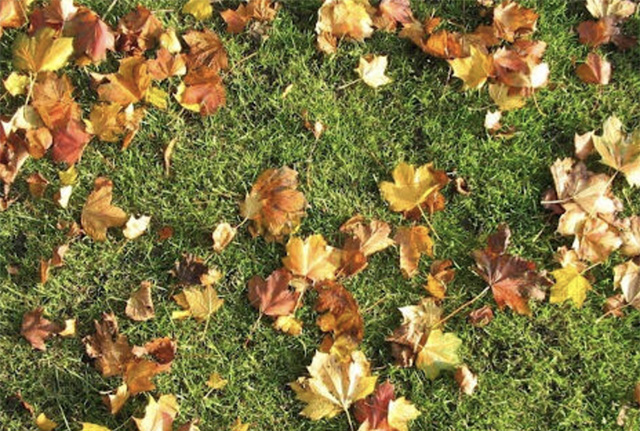
With more residents spending time at home, fall is a great time of year to take simple actions to protect our water. If you live in an area with lots of mature trees, make a commitment to remove street leaves before the rain. It’s an easy, yet very effective action that those living in the urban environment can take to reduce the amount of nutrients that wash into our waters each fall. When it rains, stormwater flows through leaf piles in streets creating a nutrient-rich “leaf tea” that travels though storm sewers making its way to our rivers and streams and can cause our waters to become green, murky and unhealthy.
But Aren’t Leaves Natural?
When leaves fall in the autumn, they quickly decompose, and rain washes the natural fertilizers out of them. When this happens in a forest or on your lawn, they are recycled into the soil and trapped there helping plants grow in the spring. But when leaves, grass clippings or other organic materials are dumped near streams or creeks, natural fertilizers go right into our water, feeding algae and bacteria while depriving fish of oxygen. This affects everyone who pays for infrastructure that keeps drinking water safe, and streets free of flooding.
Leave the Leaves
Grass clippings and leaves return nutrients and organic matter to your lawn and soil, and prevent soil compaction caused by rain and foot traffic. Shred fall leaves with your mulching blade or make multiple passes until they’re about the size of a dime (glass blades will still be visible) so they’ll break down quickly by spring. Too many? Use excess leaf material in garden beds or add it to your compost bin for a good carbon (“brown”) source. Dead leaves also provide cover for wildlife during the colder months. According the National Wildlife Federation, “Removing leaves also eliminates vital wildlife habitat. Critters ranging from turtles and toads to birds, mammals and invertebrates rely on leaf litter for food, shelter and nesting material. Many moth and butterfly caterpillars overwinter in fallen leaves before emerging in spring.”
Don’t Dump
For residents who live along a ravine or stream, do not dump leaves “over the edge.” The leaf piles will form thick mats that won’t decompose over the winter. The vegetation under the leaf piles will then die, leading to erosion on the streambank or ravine. Erosion leads to water quality problems and loss of property as the bank slides, slumps or becomes undercut by high water. The other water quality problem with leaves being introduced into streams, either through the stormwater system from street drains or through dumping over streambanks, is the depletion of oxygen that can kill fish and other stream organisms. When organic matter decomposes in streams, bacteria use up the dissolved oxygen that is needed for aquatic organisms to live.
Rake Them Right!
The 2020 Leaf Collection will run from October 12 through December 18. Collections take place on a bi-weekly schedule. Please have your leaves at the curb by 7 a.m. the Monday of each pick up week. Collections will take the entire week to complete in each zone.
Remember to Rake them Right
- Rake leaves curbside to the grassy area between the street and the sidewalk or to the curb. Never put leaf piles in the street. Leaves left in the street can be washed down storm drains where they can cause algae and impact local water quality.
- Collections occur in your zone beginning on the Monday of each pickup week between 7 a.m. and 6:30 p.m. Have leaves at the curb by 7 a.m. the Monday of your pickup week. Collections will take the entire week to complete in each zone.
- Residents can still bag leaves in biodegradable bags for weekly curbside yard waste pickup on weeks when the City crews are not doing leaf collection in their neighborhood/zone.
Click here for more information and the 2020 leaf collection schedule.
Mower Management
- Just because it’s fall doesn’t mean mowing season is over. Grass is still growing, just a bit slower.
- Reduce your mower height 1″-2″ the last mow of the season.
- Mow over large leaves directly in your yard. Shredded leaf pieces improve soil!
- At the end of the mowing season, make sure to scrape the mower deck. Tip the mower onto its side and scrape loose any caked-on grass clippings from the underside of the deck. (Grass clippings contain moisture that can cause rust.)
- Sharpen the blades! Be 100% ready for when spring rolls around. Dull blades can harm grass.
Recap
Fall is a great time of year to take simple actions to protect our water. Clogged stormdrains can cause flooding and the stormwater that flows through leaf piles in streets create a nutrient-rich “leaf tea” that makes its way to our rivers and streams and cause our waters to become green, murky and unhealthy.
Shredded leaves can benefit soil heath as they break down to provide organic matter, while whole leaf debris provides important habitat for overwintering animals.
Your city or township may collect leaves that are raked to curbside, or those placed in paper bags or designated “yard waste” cans.
Make a commitment to remove yard and street leaves before heavy rain comes in and washes them into a stormdrain!
